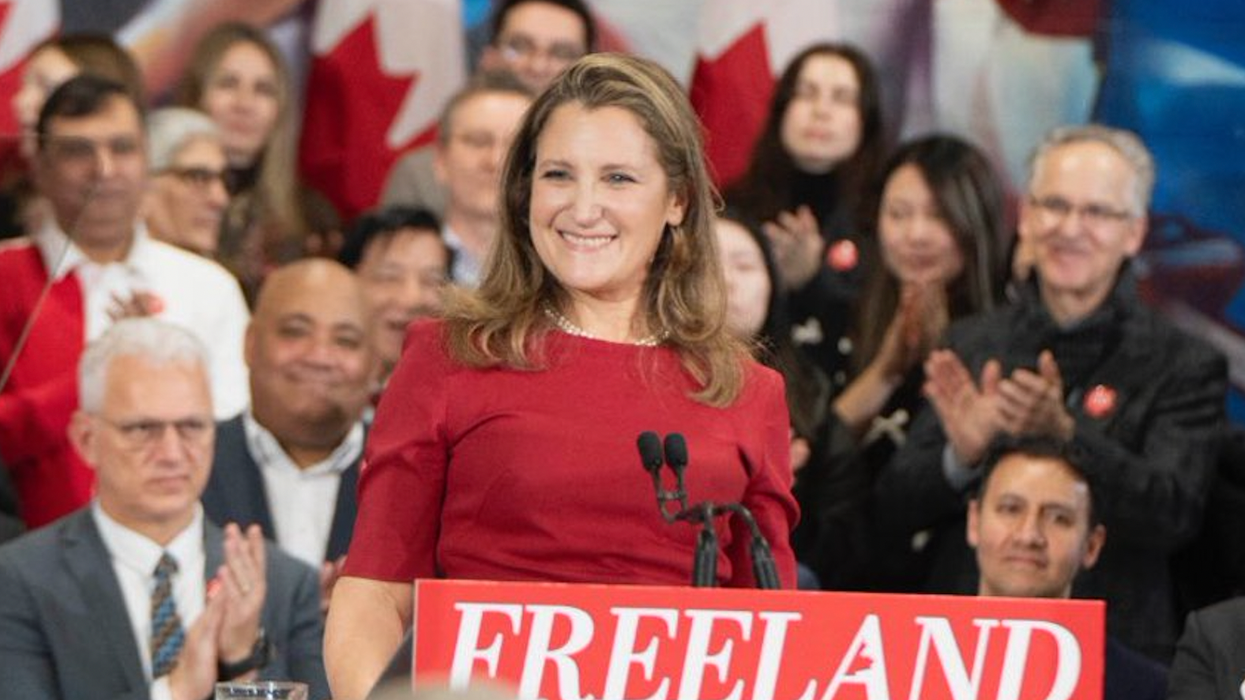Former-Finance Minister and Liberal leadership candidate Chrystia Freeland released a housing plan Monday that hones in on immigration, cutting development charges and red tape, and one-upping Conservative Party Leader Pierre Poilievre's promise to "axe the tax."
Since her dramatic stepping-down as Finance Minister under Prime Minister Trudeau in early January — a move many saw as an attempt to distance herself from the poorly-polling Canadian leader ahead of the Liberal leadership race — Freeland has forged ahead with attempts to further set herself apart from Trudeau.
Her recently issued 10-point housing plan, which takes a few pages out of Poilievre's housing book, is the latest proclamation of her differing path forward for the Liberals.
At the top of Freeland's to-do list is tying the number of new immigrants to housing availability, an immigration approach Poilievre has pushed for since early 2024, saying Canada's population growth should remain below the number of new homes being built. Of course, the Liberals have already made strides on this issue by drastically reducing immigration targets for the 2025 to 2027 period.
Freeland also plans to lower homebuilding costs and timelines by cutting development charges and red tape, reforms Poilievre has similarly advocated for. On her platform, Freeland says she would incentivize municipalities to lower development charges by making it a requirement for accessing new federal infrastructure funding.
As for cutting red tape, Freeland would "claw back funds from municipalities that do not follow through on their Housing Accelerator Fund commitments" and "work with municipalities to automatically approve Housing Catalogue standardized designs, and in major urban centres, four units per lot."
Despite voting against a motion to enact Poilievre's cutting of GST on new homes for first-time buyers in December, Freeland has now included removing the federal tax on new homes worth up to $1.5 million for first-time buyers in her housing plan, upping Poilievre's pledge to remove GST on homes worth up to $1 million.
Also in aim of improving homeownership attainability for young Canadians, Freeland is proposing to increase the Tax-Free First Home Savings Account annual contribution limit from $8,000 to $10,000, and the lifetime limit from $40,000 to $50,000.
Other notable reforms in Freeland's housing plan include kickstarting modular housing factories, championing the construction of co-ops and affordable housing, bringing back rent-to-own programs, and allowing renters to build credit for homeownership by paying rent on time.
Additionally, in light of a Monday confirmation from the Competition Bureau that they are looking into landlords using AI to price fix rents — a matter NDP member Bonita Zarrillo first requested the Bureau investigate in September 2024 — Freeland's housing plan calls for an outright ban on AI algorithms that use personal information to artificially raise rent.
On her platform, Freeland emphasizes that the cure for the housing crisis lies in a varied approach. "There is no silver bullet to fixing the housing crisis; no one policy that will build enough homes at prices Canadians can afford," she says. "My government will lead a Team Canada effort to ensure all orders of government — very much including the federal government — do their part to ensure all Canadians, whether they choose to rent or buy, have a place to call home."
Freeland's biggest competition for Liberal leadership is candidate Mark Carney, who has yet to share a concrete housing plan but has championed modular homes and other innovations that lower the cost of home construction.
The Liberal leadership vote will conclude on March 9, with voters choosing between Freedland and Carney, alongside former government House leader Karina Gould, Montreal business leader Frank Baylis, and former MP Ruby Dhalla.
- Ontario Only Added 40% Of The New Homes It Needs To Keep Up With Population ›
- New Report Calls For Overdue Modernization of Ontario's Development Charges Act ›
- OREA To Share "Report Cards" On Candidates' Housing Plans Ahead Of Ontario Election ›
- OREA Shares 'Housing Report Cards' Ahed Of Ontario Election ›
- None ›
- How Carney and Freelend Plan To Tackle The Housing Crisis ›





















